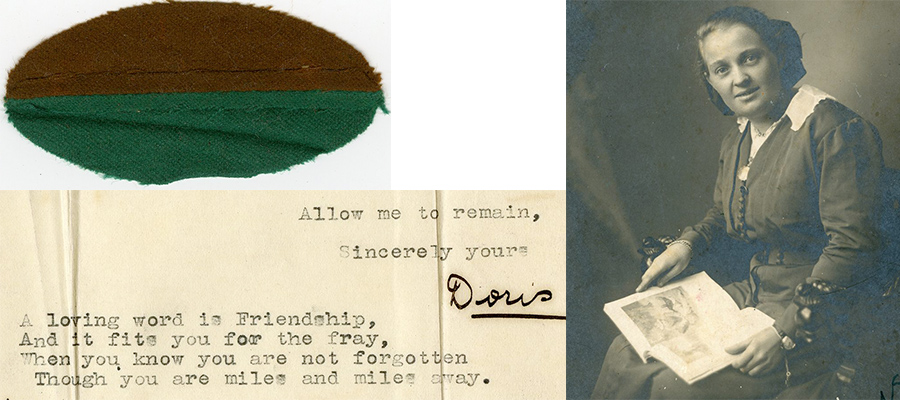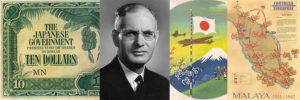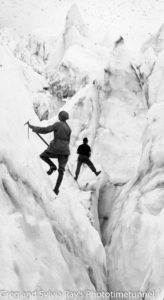Doris Schuck was 16 years old and living in Newcastle East when “The Great War” broke out. Like most youngsters in the community at the time she was intensely patriotic and she paid particular attention to the fortunes of “Newcastle’s Own” 35th Battalion of the Australian Imperial Force, so often in the thick of fierce fighting on the Western Front in Europe.
Living very close to Newcastle’s Fort Scratchley – a relic of the Russian scare of the early 20th Century – she got to know quite a few young soldiers and she wrote to some of them with great enthusiasm. She had an especially close attachment to young signaller Bruce Mitchell, but not much of the correspondence between the pair survives. One densely written card, written by Bruce from France on December 20, 1916, gives the flavour of his life at war:
Dear Dolly, Just a line from the trenches to let you known I am still in the land of the living, hoping it finds you and all at home well and happy. You will think I am writing a bit often but they are only short. I was disappointed the other day, just before we came in the trenches, I received a parcel. I thought it was from you but when I opened it I found it was from the Jesmond Soldier’s Club. It was generous of them to send it. I am writing this while on duty in the trenches somewhere in France. You will excuse the scribble. I don’t know whether you can read it or not but do your best and try and look over the dirt because there are times we don’t get a wash for a week or more – 8 to 9 days sometimes. We have to put up with it on our body, I think you will be able to put up with it on the letters. “Mitchy” was nearly scratched off the roll the day before yesterday (Monday 18th). A sergeant and myself were talking over a fire. Fritz started to pelt “wiz bangs” at us. They were falling all around us. There were several of us together but when they started flying about the others nutted off. The sgt and myself stayed there. We were at our own dugout but we didn’t stay long. The next one that came across fell on the parapet four yards behind us, blew all the parapet in and threw it all over us. I don’t know what the sgt felt like but I felt just as thought I had been thrown against a brick wall. The sgt bolted. I don’t know where he got to but I did not see him until next morning. When I came off duty he was in bed and I don’t mind stating it did not take me many hours to get out of the road. I have had two or three fairly close but that was the closest. If they don’t come any closer I won’t growl. If it had come four or five feet further forward it was “lights out” with the two of us. Well I will say au revoir for this time. Yours ever, Mitchy.

Bruce was killed in action on February 23, 1917. According to a letter sent to Doris by an officer later in the year, Bruce was on a fatigue party near Armentieres, reaching over a trench parapet to recover a piece of timber from No Man’s Land for use in repairing a dugout. He was hit by a sniper’s bullet and died on arrival at the field hospital.
Doris was also writing to another young soldier, Will Weston, and her surviving letters to him are charming and full of Newcastle gossip and news. In one letter, sent by her to Will on June 11, 1918, she describes her recent bout of appendicitis and wishes she could go and fight:
I do so often wish I was a boy, and could go over, but perhaps if I was a boy I would not be ready to go. All the same, taking it all through, I wish I were a boy.
Doris thanked Will for a photo he had sent her, and told him she had put it in her locket:
Poor Bruce is on one side and now yours is the other.
She told Will how her sister Muriel had admired the photo he sent and wanted him to write to her too. She promised to send a photo of the two sisters together, and noted that in her photo she was wearing “the beautiful colours, chocolate over green, egg-shape” – the colour-patch of the 35th Battalion.
Doris mentions how authorities at Victoria Barracks in Sydney had laid off “all the girls who are working in the barracks who were not sisters or dependents of soldiers”, replacing them with returned soldiers or their dependents.
That time I told you there was a scare in Sydney, it seems that there was some truth in it, altho’ it was tried to be kept quiet, but it has leaked out. It seems that there was a raider in the ocean near Sydney Heads, and just previous to that one was caught at Queensland. The big gun was brought out for use at Ben Buckler, a fort near Sydney.
At the races on the King’s birthday, which was a public holiday last Monday week, a horse owned by Mr Longworth of Karuah was killed. In the race it fell and was killed instantly.
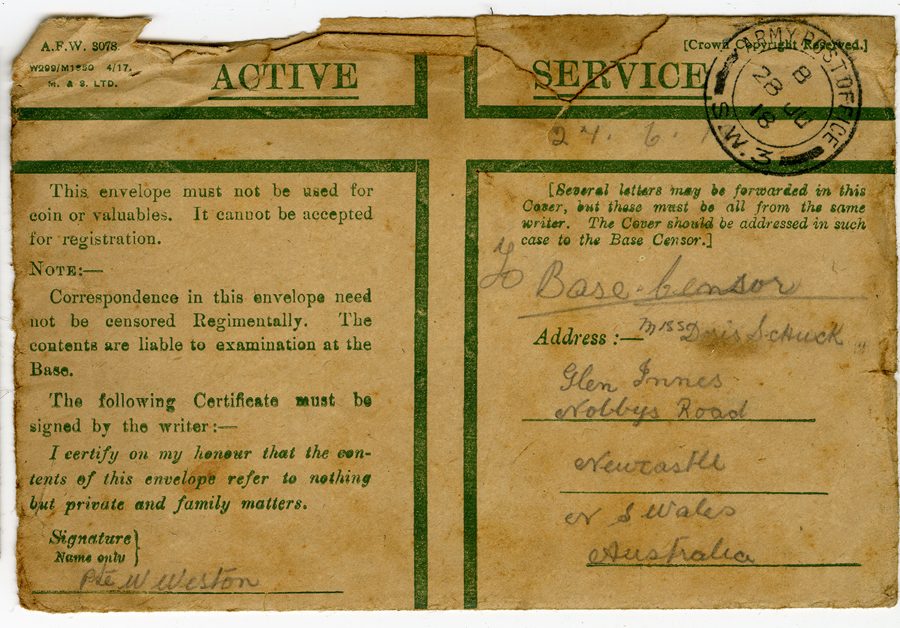
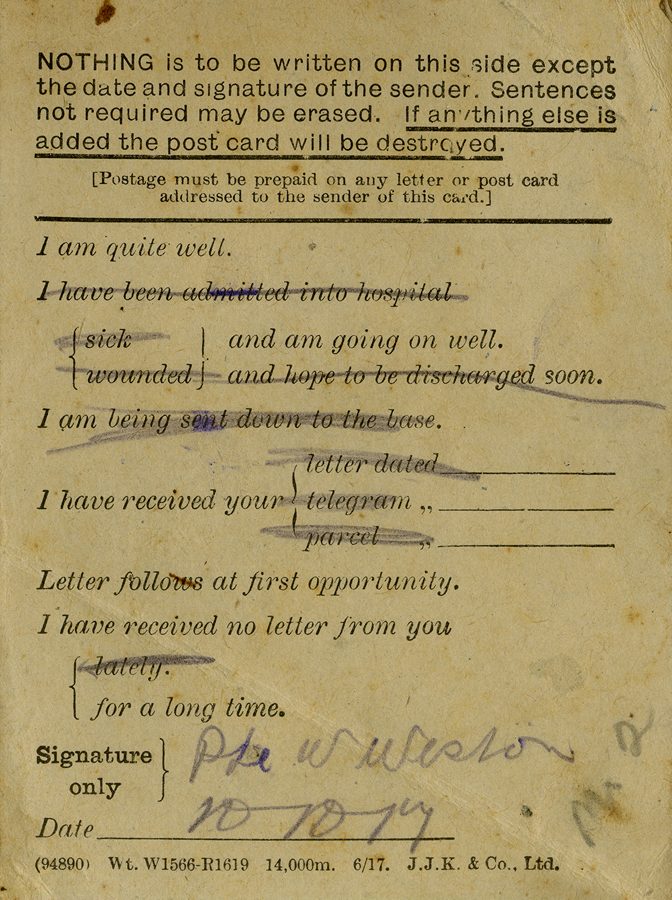
My word you ought to be over here: you would not be able to live and keep a family if you were unfortunate enough to be married, as the prices of things both eatable and wearable are monstrous and I think in some cases the prices are put up more than they should be.
The latest that the schoolchildren are collecting are tram tickets and silver paper, and it is said that the Red Cross want all the silver paper as it goes to help make artificial limbs for our poor boys and 10,000 tram tickets buys a leg too, I believe.
I told you about the “March to Freedom” column coming down from Armidale, did I not? Well they arrived here last Thursday and stayed in the Broadmeadow camp until the Saturday morning, then they entrained for Sydney. They were given a good time here. Another column from Liverpool camp is coming up to camp in Broadmeadow this week. It is called “the Baby Column” because out of the 300 there is only three over the age for active service: all the others are under 18 and they are going to be camped here until they are of age to go away.
There is a new recruiting depot built in Newcastle. This is a proper one, the other depots they had were just rooms in different places. This one is built specially for recruiting and is built in Newcomen Street, at the lower end, with the doors facing Hunter Street between the Commercial Bank and the Rawson Hotel. It had a British flag and the words “Enlisting Depot” on the front of it and at night it flashes in different colours through the electric light. It was only completed last week and opened on Friday, the day when the column marched through Newcastle.
Last week was the first anniversary of that dreadful battle of the Messines, in which so many of our dear lads fell. In the paper on Friday there were eight columns of In Memoriam notices, and nearly every one of them were boys out of the 35th Battalion or the 9th Brigade. Just fancy it is going on for four years since this dreadful war began, and to me it seems aeons, and the dreadful crimes that have been enacted in that period seem to me to be incredible and hardly able to believe such altho’ we know them to be true.
12/6/18: The Baby Column recruiting staff went to Wallsend yesterday and in the park last night a meeting was held and the boy in this office tells me that they got only one recruit altho’ there were thousands of people there.

Doris wrote to Will again on August 22, 1918. Doris knew that Will had already been wounded twice but she was unaware that he had been killed in action on August 8. Doris’s letter was intended to keep him up to date with the local news.
A bill is to be put through Parliament today to try to abolish the late shopping, that is to close the shops on Friday night and have no late night. Can you not imagine how slow the town will be if they do that? It is slow enough now, goodness knows.
I suppose you have been around the fort, where I told you I lived near, well naturally you know where the soldiers’ baths are, do you not? Well, during the strike dozens of people were down in the baths at low tide digging the coal, of which there is a great deal, and taking it away in cartloads. Yesterday where the coal had been taken away over 100 tons of earth fell down but fortunately no fishermen were there as usually there are seven or eight men fishing, but none yesterday so there was no accident, which is very lucky.
We are really going to have some plays here at last. Alan Wilkie’s company is coming here, opening tomorrow night. I like a good play. You can keep all your pictures, I would not give thankyou for them, but I do love a play and could sit them out all night, but I cannot the pictures, besides they affect my eyes and I am ashamed to say it but I go to sleep during them.
Doris told Will she was sending him a parcel of Christmas treats, even though she realised he might not receive it. She imagined if it failed to reach him it would be because it was pilfered en route, not because he might already have been killed.
After the war Doris married another of her soldier correspondents, Jack Parsons. The pair had a happy partnership until Jack lost his life as a prisoner of the Japanese in World War 2.
Thanks to Doris’s granddaughter, Kris Eyre, for access to the information used here.

